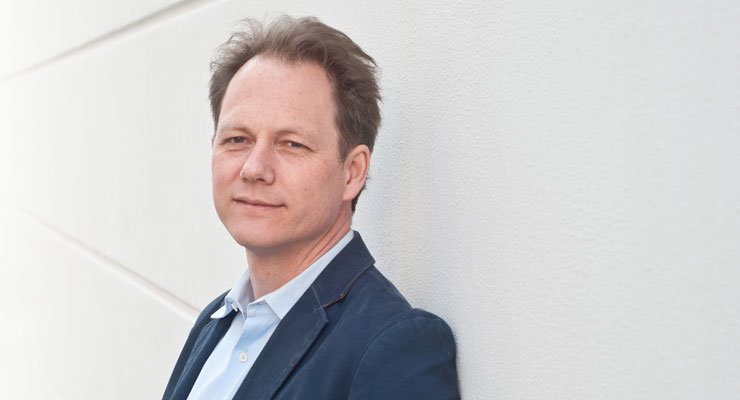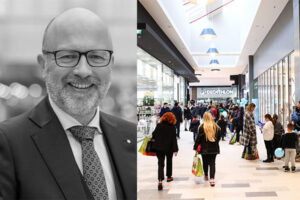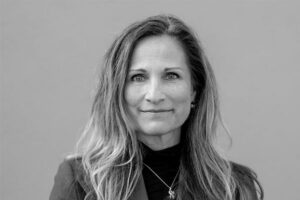ACROSS: 2023 has already kicked off as a year of crisis. What would you like to be able to say in retrospect at the end of the year?
Andreas Steinle: I have a very positive view of the future, which means I also have a positive view of the crisis at hand. At the end of 2023, I would like to be able to say that these crises have also produced something good. I would like to be able to say that Europe has come even closer together – that we are all cooperating more closely at all levels and joining forces. Cohesion in crises is even likely: The UN, for example, spoke of a pandemic of goodness in view of the social effects resulting from the coronavirus. According to its recent World Happiness Report, not only did COVID-19 bring about suffering, but it also led to an increase in mutual goodwill and social support. The willingness to help each other has doubled. The pandemic was a kind of solidarity training camp.
ACROSS: Does a crisis need to occur in order for that to happen?
Steinle: Crises force people to act – and that does not just apply to business leaders and politicians. During times of difficulty, in particular, people want to do something meaningful, precisely because they feel powerless. That automatically increases solidarity. We might not be able to change the world, but we can make a difference in our own environments. I am not saying that we need crises. However, I would like to emphasize that crises do not only produce bad things. They force us to act and to take different perspectives. As such, crises are catalysts for change and innovation. The determining factor in crises is always whether a change in direction is generally possible. If there is only despair, nothing good can come out of it. At the moment, however, I see a lot of room for positive dynamics.
ACROSS: What positive dynamics do you hope to see from the current energy crisis?
Steinle: The energy crisis is an accelerator of the ecological transformation. In the short term, there are negative effects in crises. In Germany, for example, coal is being fired up again. In the medium and long term, however, alternative energy production is the order of the day, and the course is now being set for that. We can see that very clearly in the investments that are currently being made. Start-ups from the green tech sector, in particular, are currently receiving investments that were barely conceivable a short time ago. Investors recognize the need for action. There is a large number of great technologies that can help us and the planet a great deal, and the fact that they are now also attracting the attention of investors is a positive consequence of these difficult times.
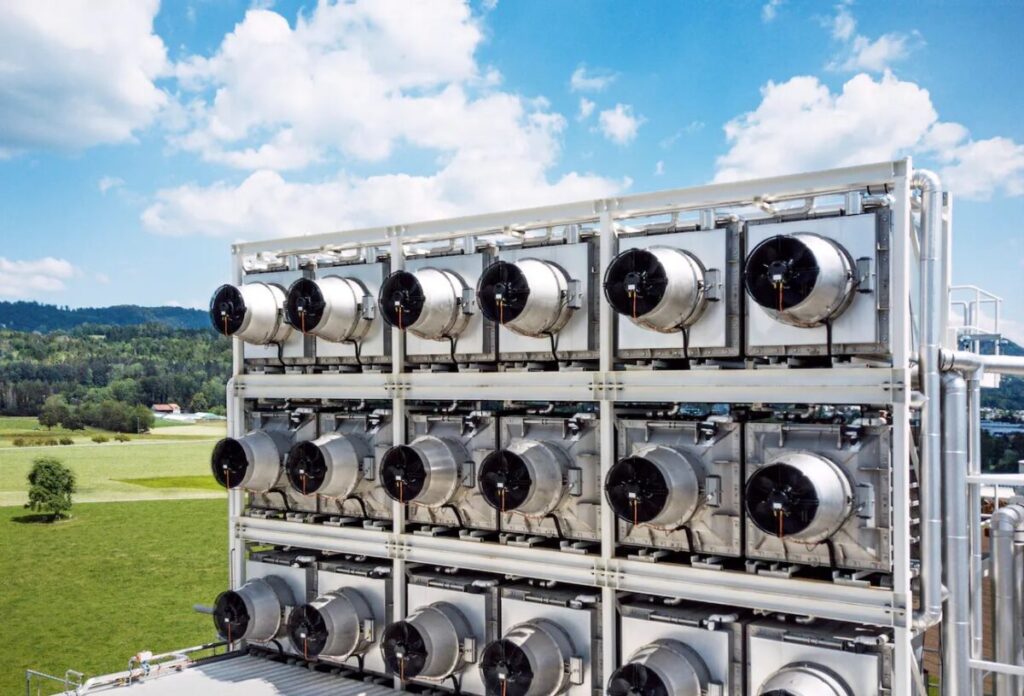
Climeworks is a Swiss company that is a global leader in carbon dioxide air capture technology. In April 2022, founders Christoph Gebald and Jan Wurzbacher raised 596.5 million euros in capital for their company. Their plants work like giant vacuum cleaners, pulling carbon dioxide directly from the surrounding air and storing it in rock or making it available for other industrial uses. Critics have long said this was against the laws of physics. In the meantime, Climeworks has become one of the most well-invested start-ups in the green tech industry.
ACROSS: In view of the large number of current problem areas: Should the green transformation be our core task in 2023?
Steinle: It should be, in the most positive sense. My greatest hope for this year is, of course, the peaceful political end of the war in Ukraine. However, no one should be naive about this topic at the moment; there is a danger of escalation. The situation hangs over the global community like the sword of Damocles. However, from a long-term perspective, global warming is certainly the crisis that should concern us the most. It has come down to the current decade. We need to move quickly now to keep the crisis manageable in the first place. Major climate catastrophes will, undoubtedly, surprise us in the coming years. Major droughts or corresponding heavy rainfall will then also result in conflicts between countries.
ACROSS: Despite the positive dynamics in capital flows, individual consumption is currently significantly less value-driven. Not only is consumption declining, the decline is also affecting product classes such as organic food.
Steinle: You have to think of it as a development that has just paused in some places. The general direction remains, but the speed has slowed down. With energy prices rising, many people have less money to shop. As a result, organic food purchases are slumping. At a time when people believe they will not have enough money at the end of the month to pay their rent, they are reaching for cheaper products, even if they go against their own organic principles. That is more than understandable. However, that should not be understood as a general change in behavior, but rather as a short-term adjustment. That behavior sometimes even hurts people themselves. Retailers must not draw the wrong conclusions from the current situation; they must also follow the general trend, while simultaneously adapting in the short term to the forced restrictions and changes in consumption.
ACROSS: What are the general consumption-driving trends that you anticipate in the coming years?
Steinle: Precisely the issues I mentioned before: Sustainability and health, which are closely linked. A good current example could be found in a Rewe initiative in Germany in January. Instead of the actual price, the retail giant showed the CO2 prices of individual products. The idea behind the initiative: How would prices for food actually have to be labelled if their climate impact was also taken into account? Rewe is, therefore, discussing a new currency. I think it is very exciting to show consumers the carbon footprint of their products and to show them that their purchases can have a positive impact, especially at a time when some people are cutting back on their consumption. The more such awareness spreads, the greater the effect.
In January, REWE presented climate awards for food for the first time. The focus was on vegan food. According to the group, they contribute to a better climate balance. The aim of the campaign was to immediately show the customer what contribution his or her own purchasing decision could make in the fight against climate change.
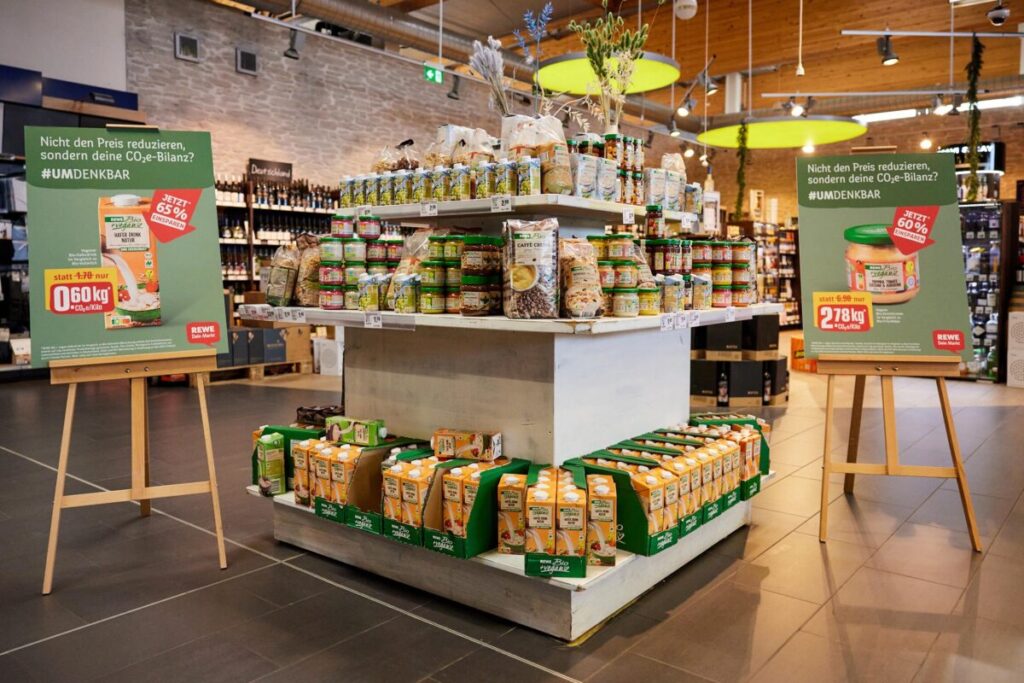
ACROSS: Can this example set a precedent?
Steinle: Retailers have a great responsibility when it comes to getting consumers to change their consumption habits. If other retailers see how such positive campaigns can score points with customers, they will naturally be inspired by them. Such forays by food producers and retailers are not new. For example, Oatly, Frosta, Mymuesli, and Nestlé Germany founded the “Together for Carbon Labelling” initiative three years ago. Supported by the climate protection organizations German Zero and Global Impact Alliance, they are committed to developing a common standard for the CO2 labelling of food. The aim of the foundation was also to increase pressure on politicians. Oatly had previously petitioned the German government for a corresponding legal label, but saw no progress.
ACROSS: How much does shaping the future depend on the economic power of the players?
Steinle: That is precisely where we feel the power that an industry can have. Oatly’s petition failed. With a major player like Nestlé, a minor player like Oatly has much more power and can ensure new regulations in the economic and consumer world – even without political support. It is all about joining forces. That, however, requires a change in thinking: If we think and act with a view to the desired result, social blockades will be overcome. A very exciting example in that respect can be seen in the TerraCycle Initiative Loop. TerraCycle is a pioneering company in the field of recycling and the reuse of problematic materials. It has created a reusable packaging system that Burger King, for example, has implemented. The moment two such disparate companies work together and join forces, there is an impact: Suddenly, people from different walks of life also come together to work toward the same positive goal.
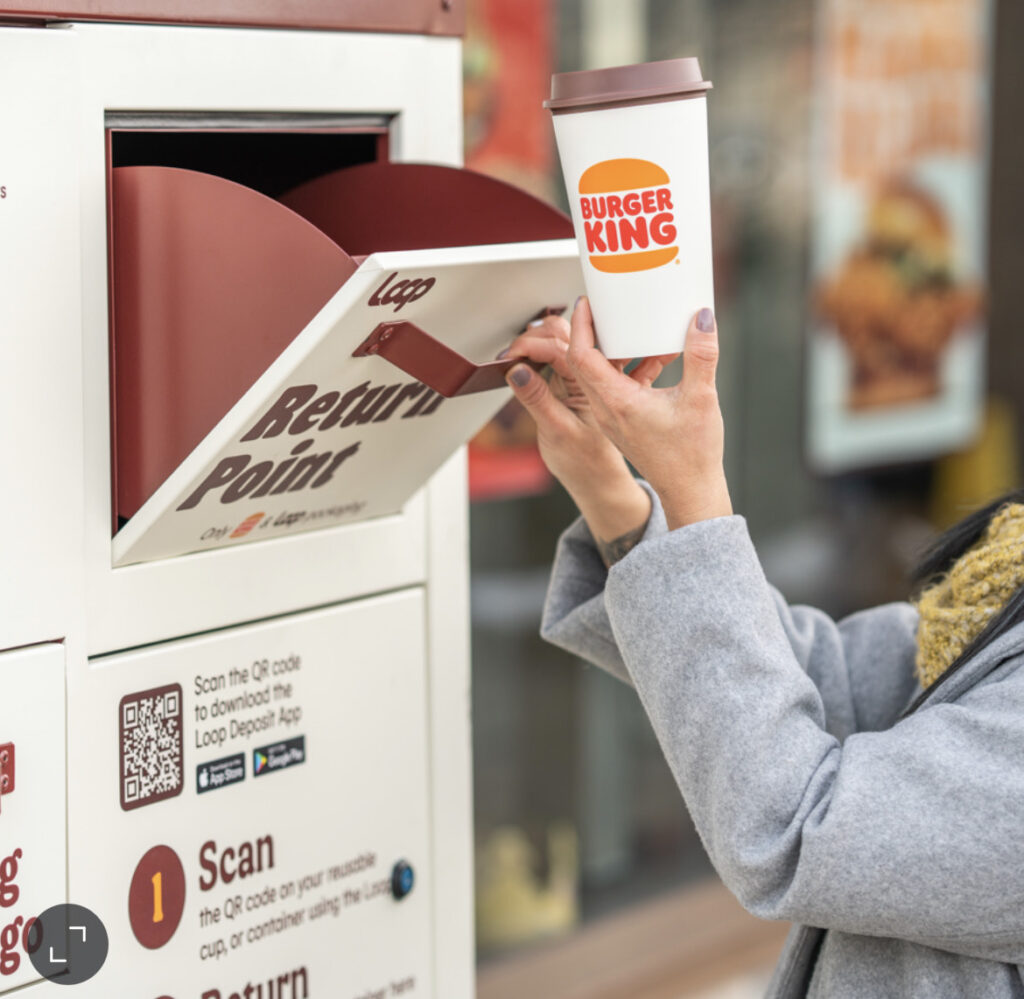
Burger King customers in the UK have the option of paying a 1.14-euro deposit for a reusable cup or container instead of using disposable packaging. They can then return the reusable packaging by scanning its barcode in the Loop app and dropping off the recyclable waste at collection points.
ACROSS: What is the overall role of retailers?
Steinle: The role of retail cannot be overstated. The opportunities to exert influence are enormous – that applies to almost all issues and thus also to the ecological transformation. Consumption is something that happens every day, which is what gives us the chance to positively confront the general population with difficult issues. Going back to the example of Rewe, that means, for example, that the customer can directly recognize the difference and its impact when he reaches for vegan meatballs instead of pork meatballs. Suddenly, the issue of CO2 reduction is tangible for him. The recognition is so much easier at the level of everyday practices than abstract scientific papers. What makes the situation tougher for the ecological transformation is that there is so little positive vision. The whole issue is so fraught and so full of horror scenarios that the majority of people believe that they are powerless to do anything about global warming anyway. According to most people, we will never be able to reach the 1.5-degree target. Apart from that, the target is also a negative target. It is all about being less bad than we are right now. That leads to an egalitarian attitude and thus to ecologically harmful consumption. That is an area in which retail can send a lot of positive signals. All discussions revolve around renunciation, but retail has the chance to turn that message around.
ACROSS: What are examples of positive reversals?
Steinle: There is something that we have to keep in mind: We already have the vast majority of the technology we need – we just need to scale it. Let us take the example of meat. We will still be able to eat the most delicious meat in the future – the only difference is that it will have been grown in bioreactors. That is exactly what will happen in the years to come. Singapore is the first, and so far, the only, country in the world in which meat that has been grown in a laboratory can be marketed and consumed by consumers. This year, the first industrial plants will be put into operation. Such technology comes from the USA. If we can establish that the people in Singapore suffer no ill effects from the grown meat, the Americans will be the next to approve the process, followed by the Europeans. The synthetic meat issue is one that I think will grow in scale.
ACROSS: What stance should retailers take on that issue?
Steinle: Retail and shopping centers are the communicators of these positive consumer visions. They are places in which we can experience parts belonging to this sustainable future and where things become very concrete. Another example can be found in the Nike House of Innovation in Paris. There, for example, the company shows impressively the individual parts that make up a sneaker. The House creates an awareness of what materials are being used and what properties they have encapsulated in an attractive environment. That leads to more conscious purchasing decisions and maximum transparency.
Not only does Nike want to use its House of Innovation to focus on the customer experience and create a holistic brand experience, but it also wants to shed light on its products and their impact on the world. That also requires transparency about the materials used and their impact on the environment.
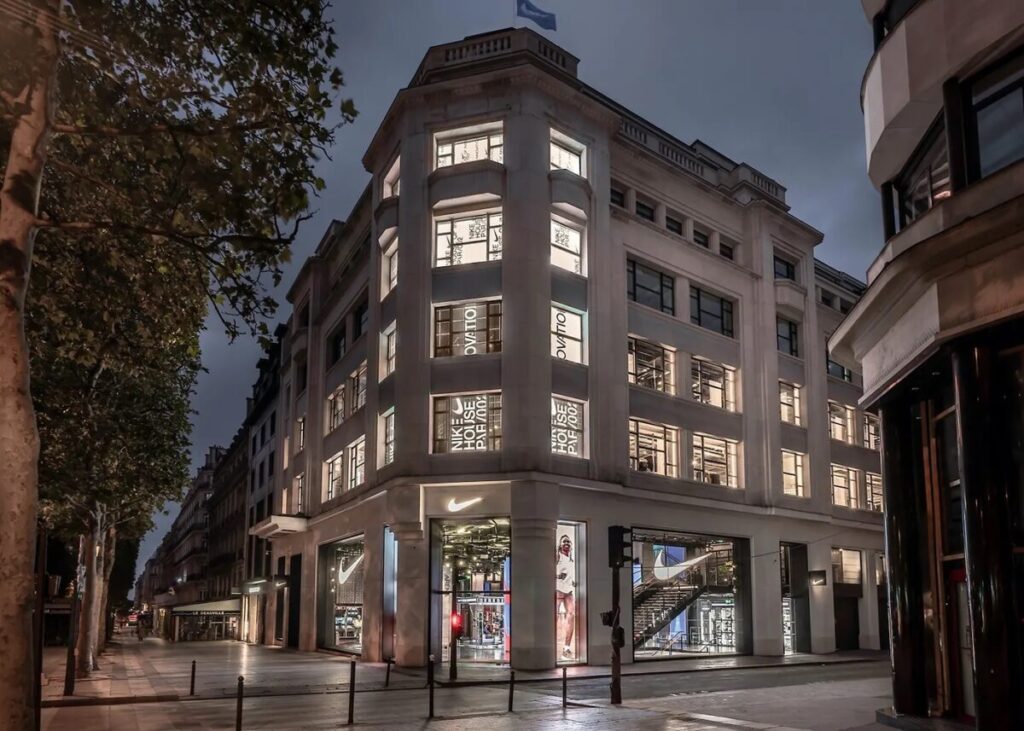
ACROSS: Many retailers still shy away from communicating sustainable initiatives in order to avoid exposure to greenwashing suspicions.
Steinle: I think those days are over. Greenwashing still occurs, of course, but those are isolated cases. Companies understand that sustainability must never be a purely marketing issue. Moreover, customers really appreciate it if they can make a contribution themselves, without having to fundamentally change their consumption. Returning to Nike: The company is certainly not the most sustainable, but that is not the point. In order to shape the future, we have to free ourselves from perfection. Those who aim for perfection usually never take any action, because failure is part of the equation. We should all follow a sustainable path that is in line with the possibilities that we have. Any initiative in such a direction is welcome. Keeping that in mind relieves retailers enormously. IKEA serves as another good example. IKEA furniture is by no mean synonymous with longevity. That is precisely why the company has launched many initiatives to recycle, resell, or dispose of furniture in accordance with the highest sustainability standards.
ACROSS: What is your message to retailers for 2023?
Steinle: Consumption presents a fundamental dilemma: The more we consume, the worse it is for the environment, and the worse it is for sustainability. We have to find a way out of this dilemma. Retailers have the opportunity to do so. The most prominent example, in this context, can certainly be seen in the sporting goods manufacturer Patagonia, which has turned its entire business model toward sustainability. One percent of sales go to environmental protection organizations. That is the ideal way to combine growth with a positive effect on the environment. However, it just shows how it can be done. On the one hand, retailers need to become aware of their influence and send out positive messages. Additionally, retailers and the placemaking industry need to understand what is actually already possible and that the ecological transformation is not a utopia. A study by McKinsey, for example, showed that three-quarters of the measures we need to implement in the EU by 2030 are feasible using technologies that are readily available on the market today. In fact, we are in a very good position.
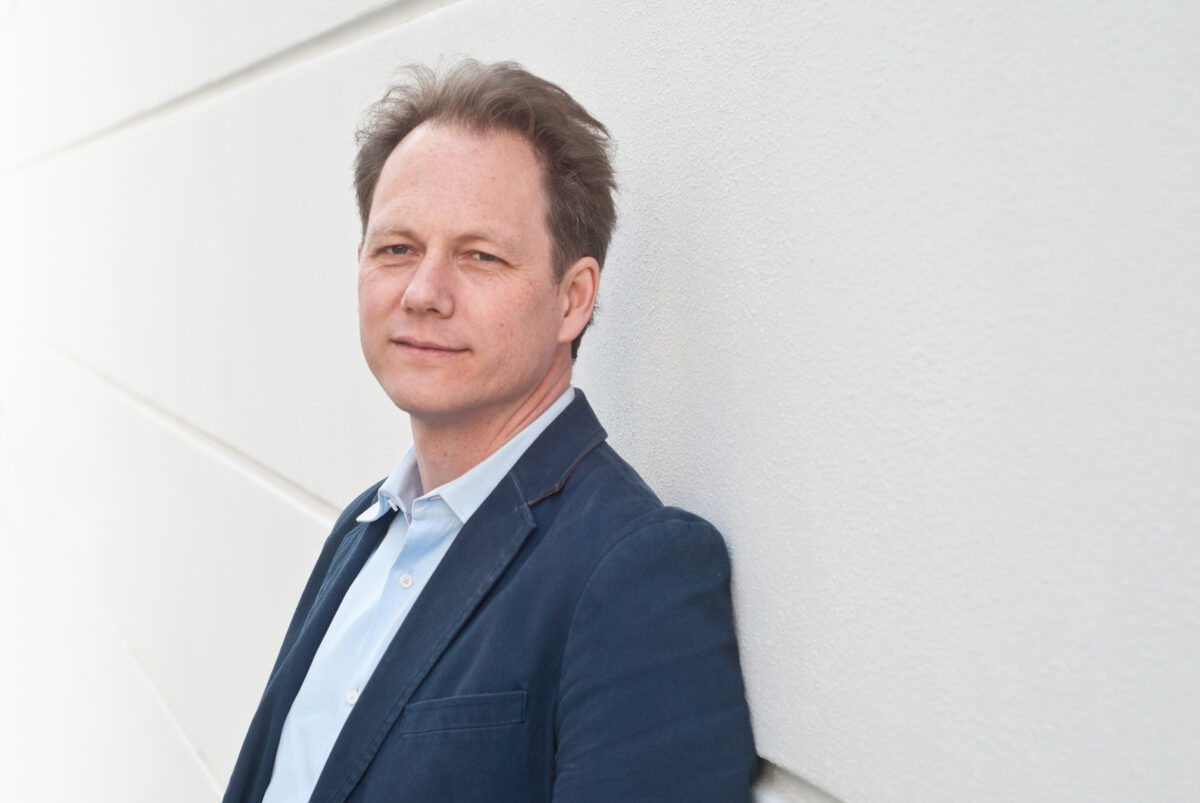
Andreas Steinle is the CEO and Founder of Zukunftsinstitut Workshop. He is a futurologist and advises international companies on how to improve their future fitness.
